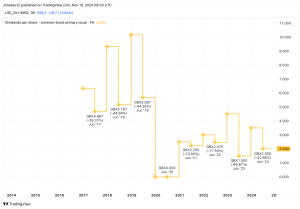After an encouraging start to 2024, the GSK (LSE: GSK) share price has endured a pretty awful few weeks, mostly due to ongoing litigation concerns relating to its heartburn drug Zantac.
But things have just got worse, causing the stock to fall some more.
What’s happened?
The latest slide has come following a decision made in the US regarding one of the company’s new vaccines that it’s hoping will prove to be a long-term earnings winner.
Yesterday (27 June), it was announced that an advisory committee of the Centers for Disease Control and Prevention had postponed a vote on whether the company’s Arexvy vaccine should be used for people aged 50-59 on safety grounds.
On top of this, the recommendation was made that the vaccine should only be used on those at-risk patients in the 60-74 age range.
Fresh blow
Having only been launched last year, reducing Arexvy‘s addressable market is a blow to the FTSE 100 pharma giant.
Arexvy targets the respiratory syncytial virus (RSV). As it sounds, the latter causes infections of the respiratory tract, leading to flu-like symptoms. It’s the leading cause of pneumonia in very young children and older adults.
Up until recently, the vaccine had been a money-spinner with the US being GSK’s biggest customer. Sales hit £1.2bn in 2023, easily outperforming rival Pfizer and its version of the jab.
But this development has left some analysts predicting a big drop in revenue.
Cheap stock
On a more positive note, it’s hard to deny that the company’s investment in its pipeline over recent years is now bearing fruit. Shingles vaccine Shingrix, for example, has been a huge success. Elsewhere, GSK recently revealed that its Jemperli drug had reduced the risk of death in patients with endometrial cancer by almost one third when used alongside chemotherapy.
With this in mind, there’s an argument that the stock’s price tag now looks compelling.
Based on analyst forecasts, the shares can be picked up for a little less than 10 times FY24 earnings. That looks cheap relative to both the healthcare sector and the market as a whole. It’s also significantly below 15 times earnings — GSK’s average valuation across the last five years.
Passive income
But there’s more.
As things stand, the stock offers a dividend yield of 4%. This is greater than I’d get from a FTSE 100 tracker. It’s also likely to be covered over twice by profit as things stand.
That ‘as things stand’ is important. Clearly, a lot will depend on the outcome of trials relating to Zantac and whether it’s proved that ranitidine — an active ingredient — increases the likelihood of developing cancer.
A negative outcome for GSK would likely involve paying substantial damages to those affected. And that could possibly lead to dividends being cut.
On the fence
Thursday’s news and the subsequent market reaction will have likely knocked the confidence of existing GSK holders. But it does arguably offer me an attractive entry point to begin building a position in a major player in a typically defensive sector. This is assuming the company is able to overcome its current woes.
Until there’s more clarity with regard to its legal battles, however, I’m prepared to watch from the sidelines.
This post was originally published on Motley Fool







